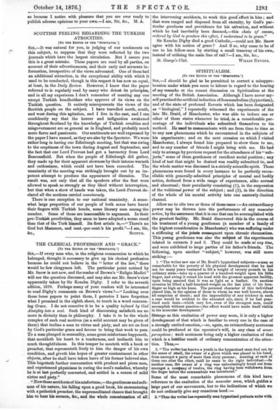THE CLERICAL PROFESSION AND "GRACE." [TO THE EDITOR OF THE
"SpacTAToa."3 Sin,—If every man who, in the religious communion to which he belonged, thought it necessary to give up his clerical profession because he could not believe in the "letter of the law," there would be few clergymen left. The particular point noticed by Mr. Snow is not new, and the reader of Brown's "Religio Medici" will see the question discussed, and may also see Mr. Snow's view apparently taken by Sir Kenelm Digby. I refer to the seventh edition, 1678. Perhaps many of your readers will be interested to read Digby's comments on Brown's views ?—" Looking over these loose papers to point them, I perceive I have forgotten what I promised in the eighth sheet, to touch in a word concern- ing Grace. I do not conceive it to be a quality infused by God Almighty into a soul. Such kind of discoursing satisfieth me no more in divinity than in philosophy. I take it to be the whole complex of such real motives (as a solid account may be given of them) that incline a man to virtue and piety, and are set on foot by God's particular grace and favour to bring that work to pass. To a man plunged in sensuality, some great misfortune bappeneth, that mouldeth his heart to a tenderness, and inclineth him to much thoughtfulness. In this temper he meeteth with a book or preacher, that representeth lively to him the danger of his own condition, and giveth him hopes of greater contentment in other objects, after he shall have taken leave of his former beloved sins. This begetteth further conversation with prudent and pious men, and experienced physicians in curing the soul's maladies, whereby he is at last perfectly converted, and settled in a course of solid virtue and piety."
"Now these accidents of his misfortune,—the gentleneas and soft- ness of his nature, his falling upon a good book, his encountering with a pathetick preacher, the unpremeditated chance that brought him to hear his sermon, &c., and the whole concatenation of all
the intervening accidents, to work this goodeffect in him ; and that were ranged and disposed from all eternity, by God's par- ticular goodness and providence for his salvation, and without which he had inevitably been damned,—this chain of causes, ordered by God to produce this effect, I understand to be grace."
Sir Kenelm Digby died a good Catholic,—could not Mr. Snow agree with his notion of grace ? And if so, why cease to be of use to his fellow-men by starting a small tramway of his own, instead of utilising the main line of rail ?—I am, Sir, &c.,


































 Previous page
Previous page